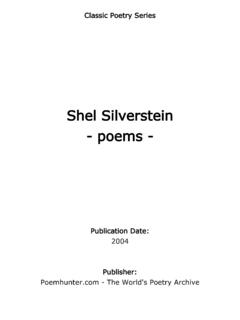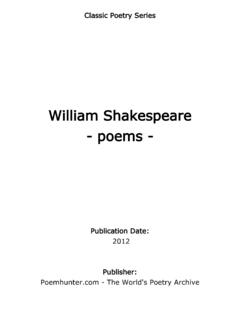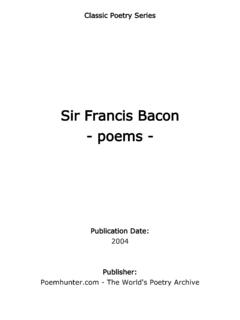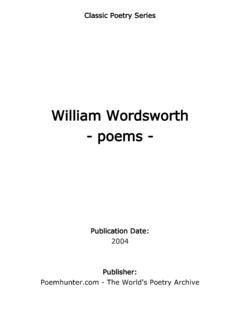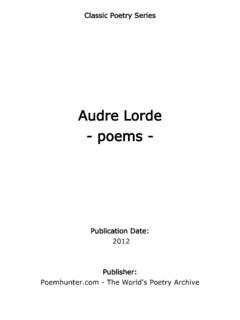Transcription of Pablo Neruda - poems - Poem Hunter
1 Classic Poetry Series Pablo Neruda - poems - Publication Date: 2011. Publisher: - The World's Poetry Archive Pablo Neruda (12 July 1904 23 September 1973). Pablo Neruda was the pen name and, later, legal name of the Chilean poet and politician Neftal Ricardo Reyes Basoalto. He chose his pen name after Czech poet Jan Neruda . Neruda wrote in a variety of styles such as erotically charged love poems as in his collection Twenty poems of Love and a Song of Despair, surrealist poems , historical epics, and overtly political manifestos. In 1971 Neruda won the Nobel Prize for Literature. Colombian novelist Gabriel Garc a M rquez once called him "the greatest poet of the 20th century in any language." Neruda always wrote in green ink as it was his personal color of hope.
2 On July 15, 1945, at Pacaembu Stadium in S o Paulo, Brazil, he read to 100,000. people in honor of Communist revolutionary leader Lu s Carlos Prestes. During his lifetime, Neruda occupied many diplomatic positions and served a stint as a senator for the Chilean Communist Party. When Conservative Chilean President Gonz lez Videla outlawed communism in Chile in 1948, a warrant was issued for Neruda 's arrest. Friends hid him for months in a house basement in the Chilean port of Valpara so. Later, Neruda escaped into exile through a mountain pass near Maihue Lake into Argentina. Years later, Neruda was a close collaborator to socialist President Salvador Allende. When Neruda returned to Chile after his Nobel Prize acceptance speech, Allende invited him to read at the Estadio Nacional before 70,000 people.
3 Neruda was hospitalized with cancer at the time of the Chilean coup d' tat led by Augusto Pinochet. Three days after being hospitalized, Neruda died of heart failure. Already a legend in life, Neruda 's death reverberated around the world. Pinochet had denied permission to transform Neruda 's funeral into a public event. However, thousands of grieving Chileans disobeyed the curfew and crowded the streets. - The World's Poetry Archive 1. carnal Apple, Woman Filled, Burning Moon,'. Carnal apple, Woman filled, burning moon, dark smell of seaweed, crush of mud and light, what secret knowledge is clasped between your pillars? What primal night does Man touch with his senses? Ay, Love is a journey through waters and stars, through suffocating air, sharp tempests of grain: Love is a war of lightning, and two bodies ruined by a single sweetness.
4 Kiss by kiss I cover your tiny infinity, your margins, your rivers, your diminutive villages, and a genital fire, transformed by delight, slips through the narrow channels of blood to precipitate a nocturnal carnation, to be, and be nothing but light in the dark. Pablo Neruda - The World's Poetry Archive 2. in The Wave-Strike Over Unquiet Stones'. In the wave-strike over unquiet stones the brightness bursts and bears the rose and the ring of water contracts to a cluster to one drop of azure brine that falls. O magnolia radiance breaking in spume, magnetic voyager whose death flowers and returns, eternal, to being and nothingness : shattered brine, dazzling leap of the ocean. Merged, you and I, my love, seal the silence while the sea destroys its continual forms, collapses its turrets of wildness and whiteness, because in the weft of those unseen garments of headlong water, and perpetual sand, we bear the sole, relentless tenderness.
5 Pablo Neruda - The World's Poetry Archive 3. march Days Return With Their Covert Light'. March days return with their covert light, and huge fish swim through the sky, vague earthly vapours progress in secret, things slip to silence one by one. Through fortuity, at this crisis of errant skies, you reunite the lives of the sea to that of fire, grey lurchings of the ship of winter to the form that love carved in the guitar. O love, O rose soaked by mermaids and spume, dancing flame that climbs the invisible stairway, to waken the blood in insomnia's labyrinth, so that the waves can complete themselves in the sky, the sea forget its cargoes and rages, and the world fall into darkness's nets. Pablo Neruda - The World's Poetry Archive 4.
6 Perhaps Not To Be Is To Be Without Your Being.'. Perhaps not to be is to be without your being, without your going, that cuts noon light like a blue flower, without your passing later through fog and stones, without the torch you lift in your hand that others may not see as golden, that perhaps no one believed blossomed the glowing origin of the rose, without, in the end, your being, your coming suddenly, inspiringly, to know my life, blaze of the rose-tree, wheat of the breeze: and it follows that I am, because you are: it follows from you are', that I am, and we: and, because of love, you will, I will, We will, come to be. Pablo Neruda - The World's Poetry Archive 5. A Dog Has Died My dog has died.
7 I buried him in the garden next to a rusted old machine. Some day I'll join him right there, but now he's gone with his shaggy coat, his bad manners and his cold nose, and I, the materialist, who never believed in any promised heaven in the sky for any human being, I believe in a heaven I'll never enter. Yes, I believe in a heaven for all dogdom where my dog waits for my arrival waving his fan-like tail in friendship. Ai, I'll not speak of sadness here on earth, of having lost a companion who was never servile. His friendship for me, like that of a porcupine withholding its authority, was the friendship of a star, aloof, with no more intimacy than was called for, with no exaggerations: he never climbed all over my clothes filling me full of his hair or his mange, he never rubbed up against my knee like other dogs obsessed with sex.
8 No, my dog used to gaze at me, paying me the attention I need, the attention required to make a vain person like me understand that, being a dog, he was wasting time, but, with those eyes so much purer than mine, he'd keep on gazing at me with a look that reserved for me alone all his sweet and shaggy life, always near me, never troubling me, and asking nothing. - The World's Poetry Archive 6. Ai, how many times have I envied his tail as we walked together on the shores of the sea in the lonely winter of Isla Negra where the wintering birds filled the sky and my hairy dog was jumping about full of the voltage of the sea's movement: my wandering dog, sniffing away with his golden tail held high, face to face with the ocean's spray.
9 Joyful, joyful, joyful, as only dogs know how to be happy with only the autonomy of their shameless spirit. There are no good-byes for my dog who has died, and we don't now and never did lie to each other. So now he's gone and I buried him, and that's all there is to it. Translated, from the Spanish, by Alfred Yankauer Pablo Neruda - The World's Poetry Archive 7. A Lemon Out of lemon flowers loosed on the moonlight, love's lashed and insatiable essences, sodden with fragrance, the lemon tree's yellow emerges, the lemons move down from the tree's planetarium Delicate merchandise! The harbors are big with it- bazaars for the light and the barbarous gold. We open the halves of a miracle, and a clotting of acids brims into the starry divisions: creation's original juices, irreducible, changeless, alive: so the freshness lives on in a lemon, in the sweet-smelling house of the rind, the proportions, arcane and acerb.
10 Cutting the lemon the knife leaves a little cathedral: alcoves unguessed by the eye that open acidulous glass to the light; topazes - The World's Poetry Archive 8. riding the droplets, altars, aromatic facades. So, while the hand holds the cut of the lemon, half a world on a trencher, the gold of the universe wells to your touch: a cup yellow with miracles, a breast and a nipple perfuming the earth;. a flashing made fruitage, the diminutive fire of a planet. Pablo Neruda - The World's Poetry Archive 9. A Song Of Despair The memory of you emerges from the night around me. The river mingles its stubborn lament with the sea. Deserted like the wharves at dawn. It is the hour of departure, oh deserted one!

